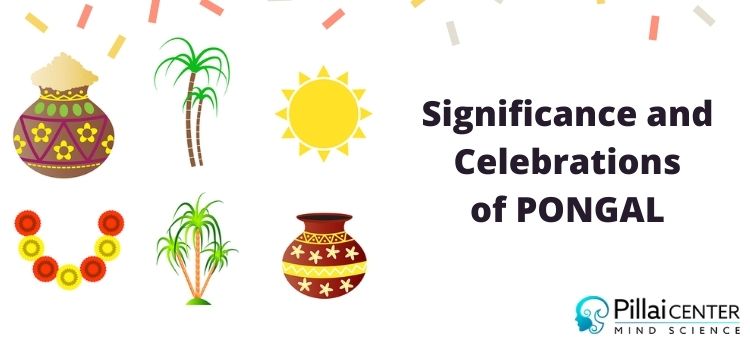
What is Pongal Festival
Pongal or Thai Pongal is the harvest festival in Tamil Nadu and is the most important festival of Tamil people. It is observed to invoke the blessings of the Sun God for a good harvest. The festival is celebrated with great pomp by the people engaged in crop cultivation and other activities related to it.
The Pongal festival got its name from the special sweet dish, Sakkara Pongal, prepared on this day to be offered to the God as ‘Naivedhya’. Pongal coincides with the Makar Sankranti, a popular festival observed across India.
Pongal Festival History
Pongal is an ancient festival celebrated by the South Indian people especially the Tamils. Pongal festival’s history dates back to the Sangam Age i.e. 200 B.C. To 300 A.D. The festival also finds mention in the Sanskrit Puranas, the Tamil people referred this festival as as Thai Un and Thai Niradal.
The Thai Un and Thai Niradal celebrations of the Sangam Era developed into today’s Pongal celebrations. As part of the celebrations, the unmarried young women of the Sangam era observed ‘Pavai Nonbu’ (Fasting) at the time of Thai Niradal. The young girls observed the fast during the Tamil month of Margazhi (December-January) and prayed for rain and prosperity of the country. During the entire month of fasting they avoid consuming milk and milk products. The girls would not apply oil to their hair and refrained from using harsh words while speaking.
The Women used to bath early in the morning and offer worship the idol of Goddess Katyayani. They end their month-long fast and penance on the first day of the Thai month (January-February). Their fasting penance was aimed to bring abundant rains to facilitate the crop cultivation. These traditions and customs of ancient era adapted to time and resulted in the emergence of the Pongal festival.
Popular Bhakti literature, Tiruppavai written by Andal and Tiruvembavai written by Manickavasagar Tiruvembavai describe the significance and procedures of the Thai Niradal festival and the ritual of observing Pavai Nonbu.
Legends of Pongal
There are several legends that through light on the origin of the Pongal festival.
According to one legend, once Shiva asked his mount, the bull (Basava) to go to the earth and instruct the people to have an oil massage and bath every day and to eat once a month. Basava descended to earth with Shiva orders and went to the people. In a slip of tongue, Basava announced to them that all should eat daily and have an oil bath once a month. When Shiva came to know about Basava’s mistake he was enraged and banished Basava to live on the earth forever. Shiva also cursed Basava that it would have to plough the fields and help people produce more food. This legend describes the association of cattle with the Pongal festival.
As per another legend is related with Lord Indra, the king of Devas and Lord Krishna, an incarnation of Maha Vishnu. During Mahabharata time there was a festival called ‘Indra Vizha’ during which people prayed to Indra and offered him special worship. In due course Indra turned arrogant upon his status of being the king of all Devas. Lord Krishna decided to teach a lesson to Indra, Kishna asked all the cowherds and their family to stop worshiping Lord Indra and instead offer their worship to the Mountain, that helps to receive rain fall and the Cattle that help in cultivation process. This angered Lord Indra and he sent forth his clouds, thunder-storms and 3 days continuous rains to teach a lesson to Krishna and the cowherds. Lord Krishna lifted Mount Govardhan with his finger and saved the cowherds and cattle. Later, Lord Indra realized his folly and realized the true power of Krishna. He came down and sought apology from Krishna.
Significance of Pongal Festival
- The Pongal festival has a rich culture and heritage.
- The festival thanks God, cattle and the nature for ensuring a successful harvest.
- Pongal brings people together.
- The festival is a testimony to the significance and meaning of the past customs and rituals.
How is Pongal Celebrated
The first day is celebrated as Bhogi Pongal and is dedicated to Lord Indra. On this day people light bonfires in front of their houses and put old clothes and waste stuff into the sacred fire. The people clean their houses and decorate by drawing ‘kolams’ with rice flour paste and red mud.
The second day is Suryan Pongal and is celebrated on the first day of ‘Thai’ month. The day is dedicated to the Sun God. People cook the traditional sweet dish called ‘Sarkkara pongal’ made of rice and lentils boiled in milk and jaggery. They offer worship to the Sun Lord and seek his blessings.
The third day is Mattu Pongal, dedicated to the cattle, an inevitable part of the agricultural society. The cows and oxen are given a bath, decorated with ornaments and flowers and are offered the ‘pongal’ that was cooked for worship. Bull fights are organized in Villages on this day.
The final day is observed as Kannum Pongal – on this day the people meet their relatives and friends and exchange gifts and pleasantries. The people also feed fowls and birds on this day.
2022 Pongal
Every year the Pongal festival falls on the first day of the Thai month. The festival date is based on the Tamil Calendar. The Pongal festival is observed for four long days, (commences on the last day of the month of Margazhi month and ends on the third day of Thai month). Corresponding to the Gregorian calendar, it generally falls between 13-16th of January every year.
In the year 2022, the Pongal festival will commence on January 13th (Thursday) and end on January 16th (Sunday).
« A Special Christmas Message from Dr. Pillai Finding Fulfillment Through Bliss »